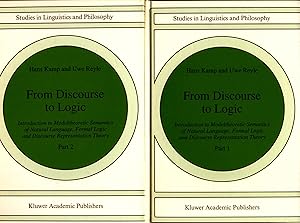9780792324034 - From Discourse to Logic: Introduction to Modeltheoretic Semantics of Natural Language, Formal Logic and Discourse Representation Theory Part 1: 42 (Studies in Lingu... (3 Ergebnisse)
FeedbackSuchfilter
Produktart
- Alle Product Types
- Bücher (3)
- Magazine & Zeitschriften (Keine weiteren Ergebnisse entsprechen dieser Verfeinerung)
- Comics (Keine weiteren Ergebnisse entsprechen dieser Verfeinerung)
- Noten (Keine weiteren Ergebnisse entsprechen dieser Verfeinerung)
- Kunst, Grafik & Poster (Keine weiteren Ergebnisse entsprechen dieser Verfeinerung)
- Fotografien (Keine weiteren Ergebnisse entsprechen dieser Verfeinerung)
- Karten (Keine weiteren Ergebnisse entsprechen dieser Verfeinerung)
- Manuskripte & Papierantiquitäten (Keine weiteren Ergebnisse entsprechen dieser Verfeinerung)
Zustand
Einband
- alle Einbände
- Hardcover (3)
- Softcover (Keine weiteren Ergebnisse entsprechen dieser Verfeinerung)
Weitere Eigenschaften
- Erstausgabe (1)
- Signiert (Keine weiteren Ergebnisse entsprechen dieser Verfeinerung)
- Schutzumschlag (Keine weiteren Ergebnisse entsprechen dieser Verfeinerung)
- Angebotsfoto (2)
Sprache (1)
Preis
- Beliebiger Preis
- Weniger als EUR 20 (Keine weiteren Ergebnisse entsprechen dieser Verfeinerung)
- EUR 20 bis EUR 45 (Keine weiteren Ergebnisse entsprechen dieser Verfeinerung)
- Mehr als EUR 45
Gratisversand
Land des Verkäufers
Verkäuferbewertung
-
EUR 254,00
Währung umrechnenKostenlos für den Versand innerhalb von/der DeutschlandAnzahl: 1 verfügbar
In den Warenkorb23 x 15,5 cm. Zustand: Gut. Volume 42. VIII, 711 Seiten ; Mit Figuren Studies in Linguistics and Philosophy 42 - Innen sauberer, guter Zustand. Hardcover, Pappeinband, mit den üblichen Bibliotheks-Markierungen, Stempeln und Einträgen, innen wie außen, siehe Bilder. (Evtl. auch Kleber- und/oder Etikettenreste, sowie -abdrücke durch abgelöste Bibliotheksschilder). Einbände sehr gut erhalten. In Englisch RW-00-02B|S57 Sprache: Englisch Gewicht in Gramm: 1390.
-
From Discourse to Logic: Introduction to Modeltheoretic Semantics of Natural Language, Formal Logic and Discourse Representation Theory Part 1 (Studies in Linguistics and Philosophy, 42)
Anbieter: Ria Christie Collections, Uxbridge, Vereinigtes Königreich
EUR 322,59
Währung umrechnenEUR 5,91 für den Versand von Vereinigtes Königreich nach DeutschlandAnzahl: Mehr als 20 verfügbar
In den WarenkorbZustand: New. In.
-
From Discourse to Logic : Introduction to Modeltheoretic Semantics of Natural Language, Formal Logic and Discourse Representation Theory Part 1
Verlag: Springer Netherlands, Springer Netherlands, 1993
ISBN 10: 079232403X ISBN 13: 9780792324034
Sprache: Englisch
Anbieter: AHA-BUCH GmbH, Einbeck, Deutschland
EUR 333,77
Währung umrechnenKostenlos für den Versand innerhalb von/der DeutschlandAnzahl: 1 verfügbar
In den WarenkorbBuch. Zustand: Neu. Druck auf Anfrage Neuware - Printed after ordering - Preface This book is about semantics and logic. More specifically, it is about the semantics and logic of natural language; and, even more specifically than that, it is about a particular way of dealing with those subjects, known as Discourse Representation Theory, or DRT. DRT is an approach towards natural language semantics which, some thirteen years ago, arose out of attempts to deal with two distinct problems. The first of those was the semantic puzzle that had been brought to contempo rary attention by Geach's notorious 'donkey sentences' - sentences like If Pedro owns some donkey, he beats it, in which the anaphoric connection we perceive between the indefinite noun phrase some donkey and the pronoun it may seem to conflict with the existential meaning of the word some. The second problem had to do with tense and aspect. Some languages, for instance French and the other Romance languages, have two morphologically distinct past tenses, a simple past (the French Passe Simple) and a continuous past (the French Imparfait). To articulate precisely what the difference between these tenses is has turned out to be surprisingly difficult.




